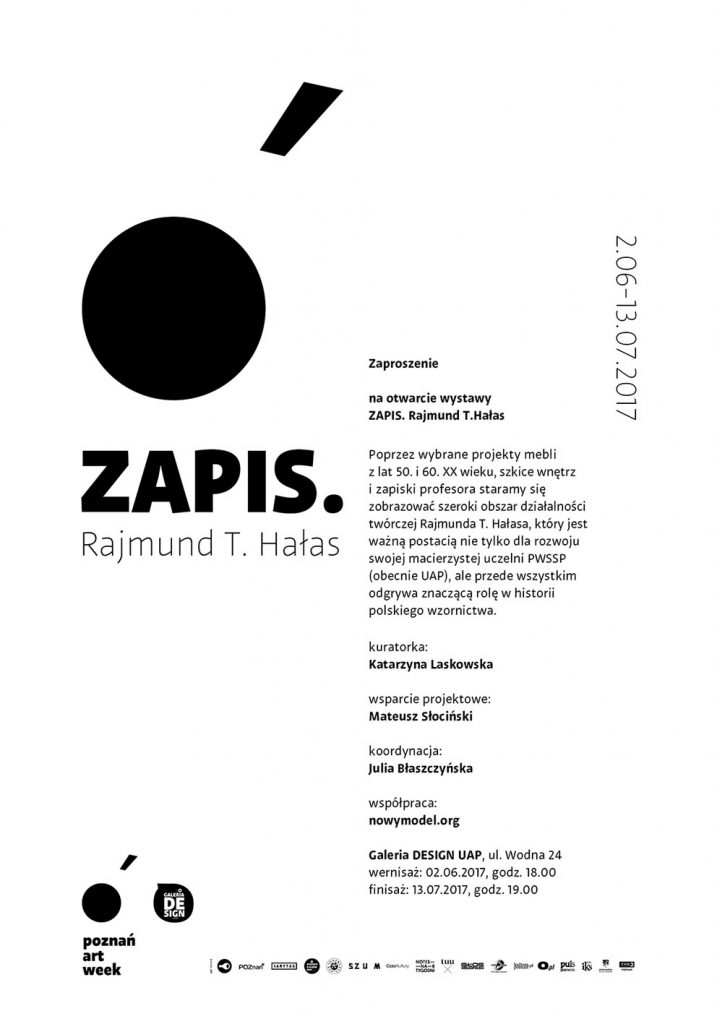ZAPIS. Rajmund T. Hałas
2.06.2017 – 13.07.2017
Opening day: 2.06., 18:00
Closing day: 13.07., 19:00
Galeria Design UAP
Ul. Wodna 24
Curator: Katarzyna Laskowska
Planning Support: Mateusz Słociński
Coordinator: Julia Błaszczyńska
In collaboration with: nowymodel.org
“Designing, in whole it’s process is an art of decision-making. The wider the knowledge of the designer, and the freer the way they think, the more accurate a decision will be made. ”
R.T. Hałas, „Poznańska szkoła mebla, kilka refleksji”.
R.T. Hałas, „Poznańska szkoła mebla, kilka refleksji”.
ZAPIS. Rajmund T. Hałas is the first of a series of exhibitions presenting the output of Wielkopolska’s designers associated with the University of Arts in Poznań. The exhibition shines a light on the creative and didactic phenomenon of Rajmund T. Hałas. The professor is important not only for his alma mater, the PWSSP(Currently UAP), but above all else, for the history of polish design. He learned the ropes of the art of carpentry in his family town, Krobia.
Currently, his family factory hosts the Museum of Woodwork and local folklore led by Rajmund Teofil Hałas’ Fundacja Ziemi Krobskiej. During his academic years in Poznań Rajmund T. Hałas studied under prof. Jerzy Staniszkis, prof. Jan Bogusławski, prof. Jan Węcławski, and prof. Jan Cieśliński.
The professor has himself shaped generations of designers, including his first assistant Jadwiga Filipiak, Tomasz Matuszewski, Sylwester Kluś, Jacek Patyk, and Bogumiła Jung. The generation of designers that came right after were, among others: Bogdan Cieślak, Tomasz Wojtkowiak, Dorota Koziara, Tomasz Augustyniak, Mikołaj Wierszyłowski. One of the more important milestones in the history of the University was 1971, when Rajmund T. Hałas created the Department of Industrial Form Design at PWSSP, later transformed into the Department of Industrial Design.
The essence of Rajmund T. Hałas’ work is the way his creative activities are intertwined with one another: design, didactics, art, and the development of the area of his expertise. Through a selection of furniture designs from the 50’s and 60’s we’re showing both the mass-produced ones, like part of the Type 1329 set, prototypes of the seats that haven’t made it to production, and the 2013 reeditions of his furniture. Since the late 50’s Rajmund T. Hałas has worked for the furniture industry, designing “New Furniture Projects” for the CORM(Later OBROM). He’s created numerous designs that the Union of Furniture Industry in Poznań has put in their catalogues. After being presented at domestic fairs, the professor’s designs have been bought and introduced to mass production. Some of the designs had survived in records, mockups, and prototypes; a few of them ended up in private collections. Based on said mockups, or just the schematics, nowymodel.org has developed and began the producion of three groups of furniture, from the Adjustable Height Bookcase in 2013, through the Coffee and Cigarettes coffee table, to the IMUGO stool.
Professor Zdzisław Kępiński, in his summary of the 50’s says: “furniture, as a field of study, was becoming an indicator of the practical functions of a room, thus becoming part of architecture (…) operating as modern architectural integration.”. He also remarks that it is since the 50’s that the term of so-called Poznań School in furniture design has been coined – a term that was still widely used as of 1971. An another name for this phenomenon, in which Rajmund T. Hałas has played a key role, is the Poznań School of Furniture. [1]
The exhibitions brings back the parallel areas of the professor’s active work towards the development of design. Rajmund T. Hałas has founded KOŁO, a group consisting of Czesław Kowalski, Leonard Kuczma, and Janusz Różański. In 1960, said group of designers had initiated numerous actions leading to the advancement of design as a whole. They’ve began working to organize a Furniture Triennale in Poznań. Less than 20 years later (1978), an Organisational Committee of the I International Furniture Triennale has been brought to life. The 1980 Poznań International Fair has hosted the I Internaional Furniture Triennale, a platform for intercultural exchange for designers, technologists, producers, and critics, with Witold Gyurkovich as the head of its office.
In 1980, Carlo Bartoli, one of the Triennale’s jury wrote: Furniture and household items are full of meanings perceivable through their form. Currently they are a reflection of the history of civilisation and techniques of the societies that manufactured them, and the way they’re used shows the evolution of customs in our society. (…) The shape of an item is like a word in spoken language – one needs to know the rules of word linking in order to speak. Analogically, to design furniture, the knowledge of the rules of form is neccessary, both from the expression’s and the technique’s point of view.”[2]. Perhaps the ZAPIS Rajmund T. Hałas will become a spark to reignite the – still valid – idea of the Furniture Triennale in Poznań?
[1] Zdzisław Kępiński, 1919-1969 PWSSP in Poznań, 1971 r.
[2] Carlo Bartoli, Furniture Triennale Catalogue, 1980 r.


